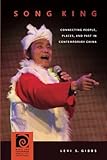Song King : Connecting People, Places, and Past in Contemporary China / Levi S. Gibbs; ed. by Frederick Lau.
Material type: TextSeries: Music and Performing Arts of Asia and the PacificPublisher: Honolulu : University of Hawaii Press, [2018]Copyright date: ©2018Description: 1 online resource (336 p.) : 28 b&w illustrations, 1 mapContent type:
TextSeries: Music and Performing Arts of Asia and the PacificPublisher: Honolulu : University of Hawaii Press, [2018]Copyright date: ©2018Description: 1 online resource (336 p.) : 28 b&w illustrations, 1 mapContent type: - 9780824869908
- 9780824876029
- 782.42162/951009 23
- ML3746.6 .G53 2018eb
- online - DeGruyter
- Issued also in print.
| Item type | Current library | Call number | URL | Status | Notes | Barcode | |
|---|---|---|---|---|---|---|---|
 eBook
eBook
|
Biblioteca "Angelicum" Pont. Univ. S.Tommaso d'Aquino Nuvola online | online - DeGruyter (Browse shelf(Opens below)) | Online access | Not for loan (Accesso limitato) | Accesso per gli utenti autorizzati / Access for authorized users | (dgr)9780824876029 |
Browsing Biblioteca "Angelicum" Pont. Univ. S.Tommaso d'Aquino shelves, Shelving location: Nuvola online Close shelf browser (Hides shelf browser)

|

|

|

|

|

|

|
||
| online - DeGruyter Understanding Reality : A Taoist Alchemical Classic / | online - DeGruyter Eyes of the Heart : Selected Plays / | online - DeGruyter Yellow Perils : China Narratives in the Contemporary World / | online - DeGruyter Song King : Connecting People, Places, and Past in Contemporary China / | online - DeGruyter Buddhist Law in Burma : A History of Dhammasattha Texts and Jurisprudence, 1250-1850 / | online - DeGruyter Li Zehou and Confucian Philosophy / | online - DeGruyter From the Mountains to the Cities : A History of Buddhist Propagation in Modern Korea / |
Frontmatter -- CONTENTS -- Acknowledgments -- Introduction: Song King as Medium -- CHAPTER 1. The Meanings of a Life -- CHAPTER 2. An Education through Song -- CHAPTER 3. Representing the Region -- CHAPTER 4. Culture Paves the Way -- CHAPTER 5. Mediating the Rural and Urban -- CHAPTER 6. Between Here and There -- CHAPTER 7. Connecting Past, Present, and Future -- Epilogue: Global Song Kings and Queens -- Notes -- References -- Index
restricted access online access with authorization star
http://purl.org/coar/access_right/c_16ec
When itinerant singers from China's countryside become iconic artists, worlds collide. The lives and performances of these representative singers become sites for conversations between the rural and urban, local and national, folk and elite, and traditional and modern. In Song King: Connecting People, Places, and Past in Contemporary China, Levi S. Gibbs examines the life and performances of "Folksong King of Western China" Wang Xiangrong (b. 1952) and explores how itinerant performers come to serve as representative symbols straddling different groups, connecting diverse audiences, and shifting between amorphous, place-based local, regional, and national identities. Moving from place to place, these border walkers embody connections between a range of localities, presenting audiences with traditional, modern, rural, and urban identities among which to continually reposition themselves in an evolving world.Born in a small mountain village near the intersection of the Great Wall and the Yellow River in a border region with a rich history of migration, Wang Xiangrong was exposed to a wide range of songs as a child. The songs of Wang's youth prepared him to create a repertoire of region-representing pieces and mediate between regions, nations, and multinational corporations in national and international performances. During the course of a career that included meeting Deng Xiaoping in 1980 and running with the Olympic torch in 2008, Wang's life, songs, and performances have come to highlight various facets of social identity in contemporary China. Drawing on extensive fieldwork with Wang and other professional folksingers from northern Shaanxi province at weddings, Chinese New Year galas, business openings, and Christmas concerts, Song King argues that songs act as public conversations people can join in on. As song kings and queens fuse personal and collective narratives in performances of iconic songs, they provide audiences with compelling models for socializing personal experience, negotiating a sense of self and group in an ever-changing world.
Issued also in print.
Mode of access: Internet via World Wide Web.
In English.
Description based on online resource; title from PDF title page (publisher's Web site, viewed 02. Mrz 2022)


